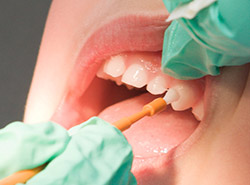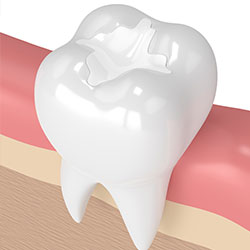Common Procedures
Topics on this page

Regular Exams and Cleanings
Regular exams are an important part of maintaining your oral health. During your regular exam, we will:
- Check for any problems that you may not see or feel
- Look for cavities or any other signs of tooth decay
- Inspect your teeth and gums for gingivitis and signs of periodontal disease
- Perform a thorough teeth cleaning
Your regular exam will take about 25 minutes. Each regular exam includes a detailed teeth cleaning, in which we will clean, polish, and rinse your teeth to remove any tartar and plaque that have built up on the tooth's surface.
Visiting our office every six months gives you the chance to talk to the doctor about any questions you may have about your oral health. Regular exams are offered by appointment only, so please contact our practice today to schedule your next dental exam and teeth cleaning.
Fluoride
 Fluoride treatment is a quick and topical way to strengthen enamel, decrease the risk of cavities and protect your child’s smile. For young teeth that are more prone to developing cavities, topical fluoride treatments are especially effective at shielding teeth from bacteria and fighting decay. Plus, we've tested them out and we have the best flavors! A fluoride treatment takes just a few minutes. After the treatment, patients may be asked not to rinse, eat, or drink for at least 30 minutes in order to allow the teeth to absorb the fluoride.
Fluoride treatment is a quick and topical way to strengthen enamel, decrease the risk of cavities and protect your child’s smile. For young teeth that are more prone to developing cavities, topical fluoride treatments are especially effective at shielding teeth from bacteria and fighting decay. Plus, we've tested them out and we have the best flavors! A fluoride treatment takes just a few minutes. After the treatment, patients may be asked not to rinse, eat, or drink for at least 30 minutes in order to allow the teeth to absorb the fluoride.
Treating Cavities with Composite Fillings
 At Dr. Rob Olivers and Associates, our team will gently remove decay, clean the affected area, and use a composite filling to protect the tooth’s structure and restore its form and function. To preserve your child’s smile, we use a special tooth-colored, BPA-free composite that mirrors the natural appearance of your child’s tooth.
At Dr. Rob Olivers and Associates, our team will gently remove decay, clean the affected area, and use a composite filling to protect the tooth’s structure and restore its form and function. To preserve your child’s smile, we use a special tooth-colored, BPA-free composite that mirrors the natural appearance of your child’s tooth.
Protecting Damaged Teeth with
Stainless Steel Crowns
Relieving Toothaches with Pulpotomies
If the pulp (nerve) of the tooth becomes infected, it can result in severe pain and discomfort, and if left untreated, even the loss of the tooth. During a pulpotomy or “baby root canal”, our will team disinfect and treat the tooth with an antibacterial medication in order to preserve the remaining healthy pulp and root of the tooth. To protect the tooth from further damage, a crown is also placed on the tooth.

Extractions
If a tooth becomes seriously damaged or infected, it may be necessary to remove the tooth to prevent the spread of infection and ensure proper oral development. We call these "Tooth Fairy Appointments." Rest assured, our team’s caring, child-friendly attitude, will make you feel comfortable knowing your child is in good hands.
Once a tooth has been removed, neighboring teeth may shift, causing problems with chewing or with your jaw joint function. To avoid these complications, your dentist may recommend that you have a spacer placed.
Sedation
We understand that some children are anxious, fearful, or restless during dental visits, so we offer sedation options to make their visits smooth and stress-free. Because each child has unique needs, we offer a variety of sedation methods that can help put your child at ease.
Nitrous Oxide (Laughing Gas)
Nitrous oxide, commonly referred to as laughing gas, is one of the most common forms of sedation used in dentistry today. Laughing gas is administered through a comfortable nose mask and takes effect after just a few minutes. This option will make your child feel a mild sense of euphoria, which will keep them calm and relaxed during treatment. Laughing gas wears off quickly so you and your little one can continue on with and enjoy the rest of your day.
General Anesthesia
When young patients require more complicated dental work and are nervous, fearful, or restless, general anesthesia can be used to help them fall completely asleep. This allows our team to provide your child with optimal care in a controlled setting and complete complex treatment in one visit. When children wake up, they will not have any memories of the experience, which will help prevent fear of the dentist for future visits.
We close down our entire office, have our anesthesiologist come, and only see 2 or 3 patients that day. Call for more questions.




